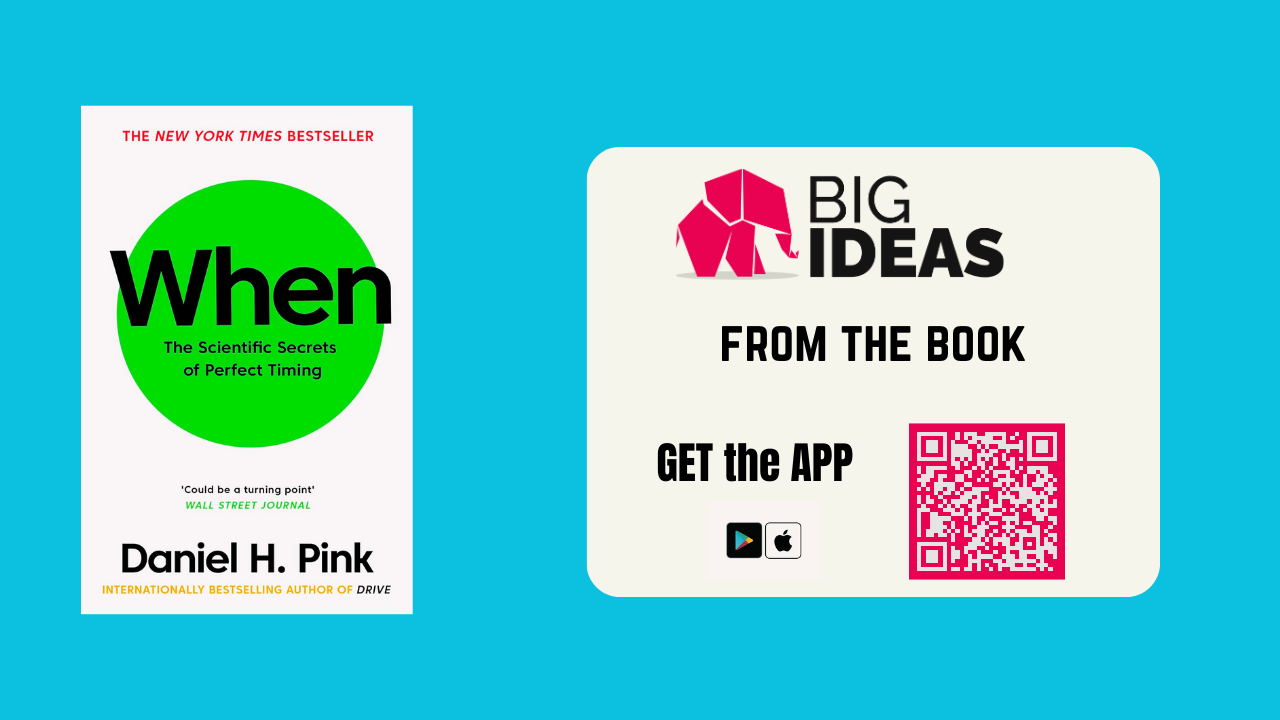But When?
Timing is an art #BigIdeas from When by Daniel Pink
Bill Gross who founded and invested in a whole lot of startups researched on why some startups succeed and most fail. He studied ‘that-one-big’ reason why startups succeed and interestingly, it wasn’t just funding or team or even the idea.
But the number one reason was: The Timing.
The number one thing was timing. Timing accounted for 42 percent of the difference between success and failure. Team and execution came in second, and the idea, the differentiability of the idea, the uniqueness of the idea, that actually came in third : Bill Gross.
If there is one thing, I have learnt from my varios iterations (fyi: I even launched India’s first shark-tank-like event..way back in 2014), it is this:
Timing isn’t just everything. Everything is timing.
And it all boils down to answering: WHEN.
Our lives are a never-ending stream of 'when' decisions: when to start a business, schedule a class, get serious about a person. Yet we make those decisions based on intuition and guesswork.
Sharing #BigIdeas from the book When: The scientific secrets to perfect timing by Daniel Pink.
What am I reading this week? Read Write Own by Chris Dixon.
Discovering Our Inner Clock: The Science of Chronobiology
Our daily lives are significantly influenced by chronobiology, the study of biological rhythms. This concept reveals that our cognitive abilities fluctuate in a predictable pattern, consisting of peaks, troughs, and rebounds.
To optimize our day, it's suggested to tackle analytical tasks during the morning peak, administrative tasks during the afternoon trough, and creative tasks during the evening recovery. This alignment can lead to more effective and efficient work.
The Momentum of Beginnings: Starting Points Matter
Beginnings play a crucial role in shaping our experiences and outcomes. The initial stages of any endeavor, be it a day, a job, or an educational journey, can set the tone for what follows.
[You can subscribe or read the big ideas from the book on the BigIdeas app for free. Get it on Android, iOS]
It's advised to leverage these starting points, especially on significant dates like New Year's or birthdays, as they offer psychological fresh starts that can boost motivation and commitment.
The Midpoint Motivation: Harnessing the Power of the Midpoint
Midpoints in any process, project, or event can be a source of motivation rather than just a mark of progress. They often serve as a wake-up call, reminding us of the urgency and the need to refocus our efforts.
"The more we learn about timing, the more we realize that timing is an art”
Recognizing and utilizing the energy of a midpoint can lead to a stronger, more determined push towards completion, turning it from a potential slump into a source of renewed vigor.
Crafting Meaningful Endings
The Art of the Final Act
Endings hold significant power in how we perceive and remember experiences. The final moments, whether of a vacation, a career, or a project, can leave a lasting impression that overshadows the rest of the experience.
It's recommended to consciously craft these final moments to be positive and meaningful, ensuring they leave a favorable and lasting impact.
The Strength of Synchronization
Synchronized Success
Synchronization, the act of aligning our actions with others, can enhance performance and create a sense of unity.
This concept extends beyond physical activities to workplaces and communities, suggesting that moving in harmony with others can lead to greater collective achievements and personal satisfaction.
Rethinking Breaks
The Strategic Pause
Contrary to traditional views, breaks are essential for maintaining productivity, creativity, and well-being. Regular, well-timed breaks, especially those involving nature, social interactions, or short naps, can significantly enhance performance and mental health.
Breaks are not a sign of sloth but a sign of strength.
This perspective challenges the non-stop work ethic, advocating for a more balanced approach to work and rest.
Impact of Beginnings and Endings
The Power of First and Last Impressions
Beginnings and endings are crucial in shaping our perception of experiences. A strong start sets a positive tone and can boost motivation, while a meaningful ending significantly influences how we remember and evaluate an event.
Recognizing the importance of these pivotal moments is essential, as they are more than mere markers in time; they fundamentally shape our narrative and experience.
Aligning Tasks with Natural Rhythms
Optimal Timing for Peak Performance
Understanding and aligning tasks with our natural daily rhythms can significantly enhance efficiency and effectiveness. Knowing when one is most alert, creative, or reflective helps in scheduling tasks for optimal performance.
This approach not only improves productivity but also aligns work with our biological clock, leading to better overall well-being.
The Importance of Positive Endings
Crafting Memorable Conclusions
Endings have a disproportionate impact on how experiences are perceived and remembered. Ensuring that events, projects, or interactions conclude on a positive and memorable note can greatly enhance satisfaction.
This insight is crucial for effectively planning and executing tasks, leaving a lasting positive impression.
Time's Influence on Behavior
The Psychological Effects of Time
Our perception of time plays a significant role in influencing behavior and decisions. Factors like deadlines, anniversaries, and the awareness of time passing can drastically affect motivation and productivity.
Understanding how time impacts our approach to tasks and goals is essential for effective planning and decision-making.



